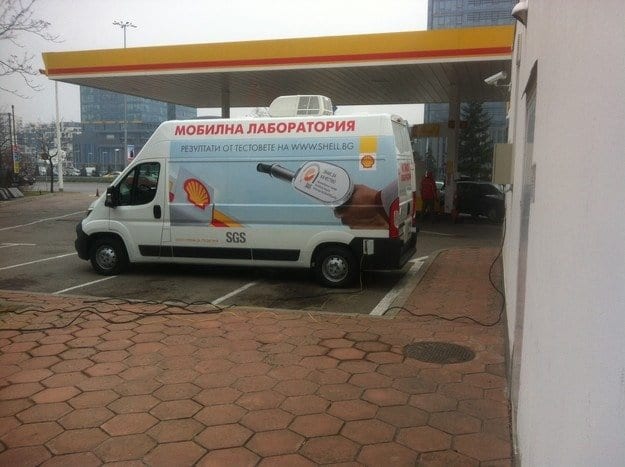
Test drive Inspection is the best guarantee of quality

SGS has conducted over 15 quality analyzes of Shell fuels.
Since September 2015, an independent expert company SGS has been testing Shell fuel by visiting filling stations without prior notice and analyzing 9 petrol and 10 diesel parameters on site. We speak with Dimitar Marikin, SGS Bulgaria Manager and SGS Regional Director for South East and Central Europe, about Shell's fuel quality after 15 inspections and the procedures by which they are monitored.
What kind of organization is SGS?
SGS is a world leader in inspection, verification, testing and certification and has been present in Bulgaria since 1991. With over 400 experts all over the country, headquarters in Sofia and operational offices in Varna, Burgas, Ruse, Plovdiv and Svilengrad. the company has established itself as a leading provider of services in the field of product and service quality certification. SGS Bulgaria accredited laboratories offer a wide range of services for petroleum and chemical products, consumer goods, agricultural products; services in the field of industrial production and the environment, microbiology, GMOs, soil, water, textiles, as well as in the field of certification of management systems.
Why did Shell choose SGS as its fuel quality control authority?
SGS Bulgaria is a company with many years of experience in the market not only in Bulgaria but all over the world. It has an impeccable reputation and international recognition, which guarantees the objectivity and quality of the services offered. SGS is the world leader in certification, control, inspection and laboratory services for the oil and gas industry, and the SGS Quality Seal is the most comprehensive fuel quality verification program on the market.
What is the SGS petrol station inspection procedure, how often and since when?
The project started on 01.09.2015. To this end, a specially equipped mobile laboratory has been created in the country under the SGS logo, which, without prior notice, visits Shell filling stations and analyzes 9 parameters of gasoline and 10 parameters of diesel fuel on site. The project schedule provides for visits to 10 sites per month. The analysis in the mobile laboratory is carried out by SGS specialists using high-tech instruments that monitor gasoline parameters such as octane number, sulfur, vapor pressure, distillation characteristics, etc. C, flash point, water content, sulfur, etc. The transparency of the data obtained as a result of the analyzes carried out is ensured by the constant announcement and updating of test results at each petrol station on the site and at the corresponding outlet.
Starting this month, one part of the samples is analyzed in the mobile laboratory, and the other part in the stationary SGS laboratory.
What are the exact parameters for assessing fuel quality and against what standards is fuel evaluated?
The norms for assessing the analyzed indicators correspond to the effect of fuel on the operational parameters of vehicles, as well as to the requirements of the Decree on requirements for the quality of liquid fuel, conditions, procedure and method of their control.
The parameters by which the fuel is evaluated are as follows:
Petrol: Appearance, density, research octane, engine octane, distillation, sulfur content, benzene content, oxygen content, total oxygen (the last two indicators are determined only for samples that are analyzed in a stationary laboratory).
Diesel fuel: Appearance, density, cetane number, biodiesel content, flash point, sulfur, filterability temperature, water content, distillation, microbiological contamination
What does SGS certified quality fuel mean?
The SGS fuel certification means that it has good performance and environmental characteristics.
The SGS Quality Seal is the most complete and comprehensive fuel quality verification program on the market. When you see the Quality Seal sticker at a gas station, you can be sure that the fuel supplier is reliable and that the fuel you are buying meets European standards. The presence of the "Seal of Quality" in the relevant shopping mall confirms that this shopping mall offers fuel that meets BDS quality standards and European standards.
What is the guarantee for customers that SGS-rated fuel actually meets standards?
SGS is a world leader with many years of experience and an impeccable reputation for quality control. Our methodology, based on international experience and knowledge, allows us not only to control mandatory fuel parameters that are part of the regulatory requirements, but also to conduct additional analyzes of microbiological contamination of diesel fuel, which is done for the first time in Bulgaria.
Are there any differences in the fuel parameters of different filling stations?
Shell supplies various fuels: Shell FuelSave Diesel, Shell V-Power Diesel, Shell FuelSave 95, Shell V-Power 95, Shell V-Power Racing.
There are differences in the characteristics of different fuels due to the different characteristics of the products of individual brands, but our checks show that these brands are maintained at a constant quality at different filling stations.
Of course, this feeling arises after customers, but I can assure you that it is subjective or related to factors beyond the quality of the fuel, because our checks do not confirm this. Analysis shows that the quality of the various filling stations is kept constant. In fact, this is one of the requirements for awarding the "Quality Seal" in the network.
Can the client check the test results? Are they published somewhere?
The transparency of the data obtained as a result of the analyzes carried out is ensured through the constant announcement and updating of test results at each gas station on the site and at the corresponding outlet. Any interested buyer can personally verify the quality of the fuel he uses.
Are there differences in the standards for gasoline and diesel fuel in winter and summer?
Yes, there is a difference, and this is due to different limit values for some indicators established in the Decree on the requirements for the quality of liquid fuels, conditions, procedures and methods for their control. For example, for motor gasoline - in the summer the indicator "Vapor pressure" is checked, for diesel fuel - in the winter the indicator "Limiting filterability temperature" is checked.
Have you noticed any significant differences in the parameters of Shell fuels over time from the audit results and accumulated data?
Not. The quality of the analyzed fuels in the Shell chain fully complies with the Bulgarian and European quality standards.
Interview with Georgy Kolev, editor of auto motor und sport magazine
